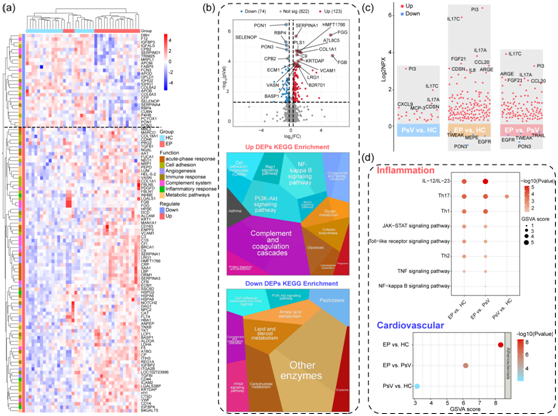On August 16, 2023, Prof. Jin Hongzhong's team from the Department of Dermatology at Peking Union Medical College Hospital published a research paper titled “Integrative Serum Proteomics Analysis Reveals Dysregulation of Distinct Immune and Cardiovascular Profiles in Erythrodermic Psoriasis” in the esteemed international journal, the “British Journal of Dermatology” (IF=10.3, a Tier 1 journal, or among the top 5%, as ranked by the Chinese Academy of Sciences). This groundbreaking study presents, for the first time, a comprehensive characterization of the blood proteomics molecular spectrum in erythrodermic psoriasis. It elucidates the molecular features of peripheral inflammatory phenotypes and cardiovascular metabolic dysfunction associated with this disease, thereby establishing a potential link between the systemic inflammatory dysregulation and the risk of cardiovascular diseases in erythrodermic psoriasis. The research received support from the National High Level Hospital Clinical Research Funding.
Erythrodermic psoriasis, a rare and severe subtype of psoriasis, is characterized by extensive skin inflammation and acute systemic symptoms involving immune dysfunction. Limited evidence suggests that immune dysregulation and shifts in the inflammatory phenotype may contribute to the pathogenesis of erythrodermic psoriasis. However, specific driving factors within the immune pathways and inflammatory circuits underlying the phenotypes of erythrodermic psoriasis remain unknown. In-depth analysis of changes in the circulating proteome will shed light on the systemic inflammatory characteristics of erythrodermic psoriasis and facilitate the identification of potential biomarkers and therapeutic targets.
The research team conducted an in-depth exploration of the global serum proteome of erythrodermic psoriasis using data-independent acquisition mass spectrometry (DIA-MS). Consistent with the clinically observed high inflammatory state in erythrodermic psoriasis, the researchers discovered a significant enrichment of inflammatory proteins in the serum of erythrodermic psoriasis patients. This includes upregulation of acute phase proteins and complement system-related proteins.
The research team further employed the OLINK high-throughput proteomics to compare the expression of inflammation, immune response, and cardiovascular metabolism biomarkers in the sera of erythrodermic psoriasis and plaque psoriasis. They found that erythrodermic psoriasis exhibited more severe circulating protein dysregulation, stronger immune activation, and higher psoriatic inflammation tone. Gene set variation analysis revealed multiple disturbances in inflammatory pathways in the serum of erythrodermic psoriasis, including significant activation of the TH1/TH17 axis (type 1/type 3 inflammation) and mild deviation of the TH2 axis (type 2 inflammation), as well as upregulation of the atherosclerosis pathway.

▲Major research results
This study represents pioneering efforts in integrating untargeted and targeted proteomics , providing novel and complementary insights into the systemic inflammatory protein profile of erythrodermic psoriasis. It emphasizes the dysregulation of immune pathways and inflammatory circuits as key factors in the pathogenesis of this disease. The study, for the first time, compares the inflammation and cardiovascular molecular differences between erythrodermic psoriasis and common types of psoriasis, offering a unique perspective on the association between systemic inflammatory disruption and cardiovascular risks in erythrodermic psoriasis patients. These findings enhance our understanding of different inflammatory phenotypes and pathophysiological mechanisms in erythrodermic psoriasis, underlining the need for further exploration of immune therapeutic strategies targeting this psoriasis subtype.
Edited by Wang Jingxia and Chen Xiao
Translated by Liu Haiyan
Reviewed by Zhang Shu and Wang Yao
